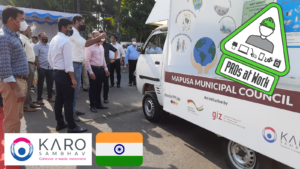 20/08/2021
20/08/2021Karo Sambhav joined the WEEE Forum in January 2020 and is India’s leading Producer Responsibility Organisation. Since its inception in 2017, Karo Sambhav has processed more than 16,000 tonnes of e-waste on behalf of 40+ electronics producers. Its programmes have engaged 3,000+ schools, 500+ bulk consumers, 5,000+ informal workers in 60+ cities across all states in the country. Karo Sambhav’s outreach activities have sensitized over 3 million individuals through 2,300+ workshops.
As a part of its strategic engagements with multilateral agencies, Karo Sambhav and Deutsche Gesellschaft für Internationale Zusammenarbeit (GIZ) GmbH are working together in the framework of the funding programme develoPPP, which the GIZ implements on behalf of the German Federal Ministry for Economic Cooperation and Development (BMZ)The Project titled ‘Developing Collection Infrastructure & Recycling Platform for Plastic Waste & E-Waste in Non-Urban India’ focuses on rural and semi-urban areas to develop legitimate and inclusive collection systems, while ensuring financial viability of such programmes.
Karo Sambhav, one of the first PROs to be recognised and registered in India for e-waste management, now works across multiple waste types. The PRO collaborates with value chain actors across all levels: right from ecosystem enablers to collection partners. It is also the first and only WEEE Forum member representing Asia. Karo has established a presence in each Indian state via on-ground teams and collection infrastructure. While formal collection systems have recently reached most metro cities, rural and semi-urban areas are often left out from channel development activities due to lack of scale and low scope for cost optimisation. This project marks Karo Sambhav’s foray into semi-urban regions of Goa, Ghaziabad and Varanasi that were otherwise not serviced by EPR-driven waste management systems. Key efforts are being made to experiment and map the true costs of developing collection channels and engaging directly with consumers in a diverse country like India, especially in remote and rural regions.
The 3-year project which will continue until October 2022 has ambitious objectives that target multiple stakeholders and activities at various levels of the value chain. These objectives include:
- Establishing a responsible plastic and e-waste management system that is scalable
- Develop processes and implement systems for plastic waste and e-waste that are inclusive, traceable and legitimate
- Create collection networks for plastic and e-waste through formalisation and capacity building programmes with informal sector actors
The project has been able to reach over 1,000 people, generated 50 livelihoods and recycled/ processed over 500 tonnes of plastic and electronic waste. This was achieved despite the stringent lockdown measures due to the pandemic. While the project is still being implemented, there are some critical short-term outcomes that have been observed:
- A low cost, model unit was set up to study and document operational benchmarks for manual dismantling. A first of its kind, these benchmarks can provide valuable information to decision makers- producers and governments- to gauge and audit legitimacy of recycling operations in India. Karo Sambhav and GIZ will be releasing the findings as a white paper in this quarter.
- GIZ and Karo Sambhav launched a campaign called #RECYCLEGIRI. Recyclegiri is our take on making recycling a part of life. The word ‘Giri’ is a colloquial suffix – means one action or a set of all action’s characteristic of the prefix word, in this context ‘Recycle’. Stemmed from the word Gandhigiri- Recyclegiri is all about being responsible and taking charge of our actions.
- Formalisation and capacity building programmes continue to be an important intervention. Such programmes, implemented by Karo Sambhav at a national scale in the past, have accelerated the transition of workers from informal dismantling and recycling to formal collection channels. This has directly led to generation of green jobs and growth of green SMEs in the sector.
- Programmes were able to deepen the collection network by reaching out to smaller aggregators and waste pickers directly. While the waste quantities are smaller, it is important to develop these channels and integrate them into collection schemes. Diversifying collection sources and widening the geographic spread to rural and semi-urban areas can provide access to untapped inflows of waste and engage new audiences.
- Karo Sambhav’s tech platform captures information for all activities implemented under the programme. Technology plays an important role in ensuring traceability and efficiency of operations at scale. Not only does it allow for end-to-end tracking of waste, it can provide insights about material flows, collection sources and costs.
- Innovation is required to reach consumers through unexplored channels. Karo Sambhav piloted programmes to study the waste flows and behaviour change outcomes from places like public distribution systems, mobile vans, pop-up waste collection drives and door-to-door pick-ups.
The project highlights the need for innovation and investment in enabling the ecosystem that further allows EPR to function in the Indian context. Consistent experimentation, learning and piloting new programmes can positively affect not just PROs, but also add value to producers, governments, alliances and other decision makers.
About
The WEEE Forum a.i.s.b.l. is an international association representing 51 producer responsibility organisations across the globe. Together with our members, we are at the forefront of turning the extended producer responsibility principle into an effective electronic waste management policy approach through our combined knowledge of the technical, business and operational aspects of collection, logistics, de-pollution, processing, preparing for reuse and reporting of e-waste. Our mission is to be the world’s foremost e-waste competence centre excelling in the implementation of the circularity principle.
Transparency Register ID 702397445-73.
Copyright 2019 All Rights Reserved
Contact
BluePoint conference and
business centre
Boulevard Auguste Reyerslaan 80
B-1030 Brussels
Belgium
Newsletter
Subscribe to our mailing list to get the updates to your email inbox.